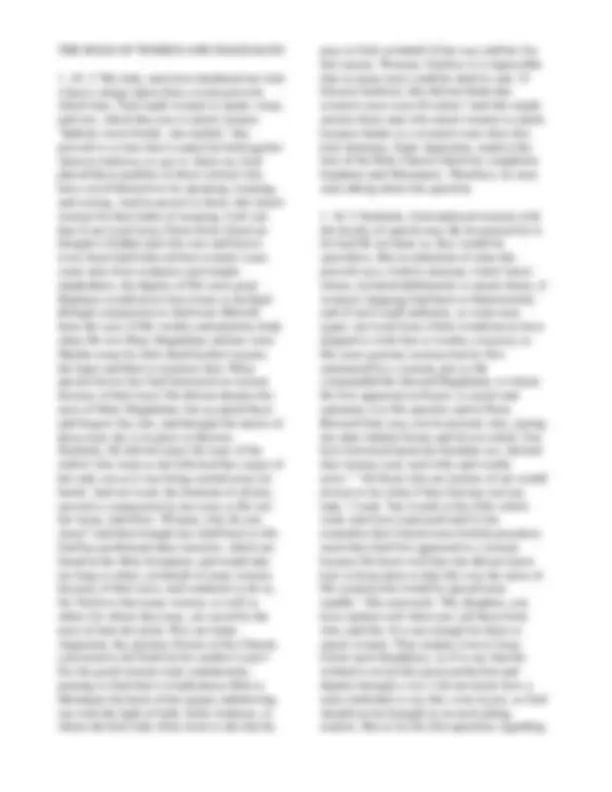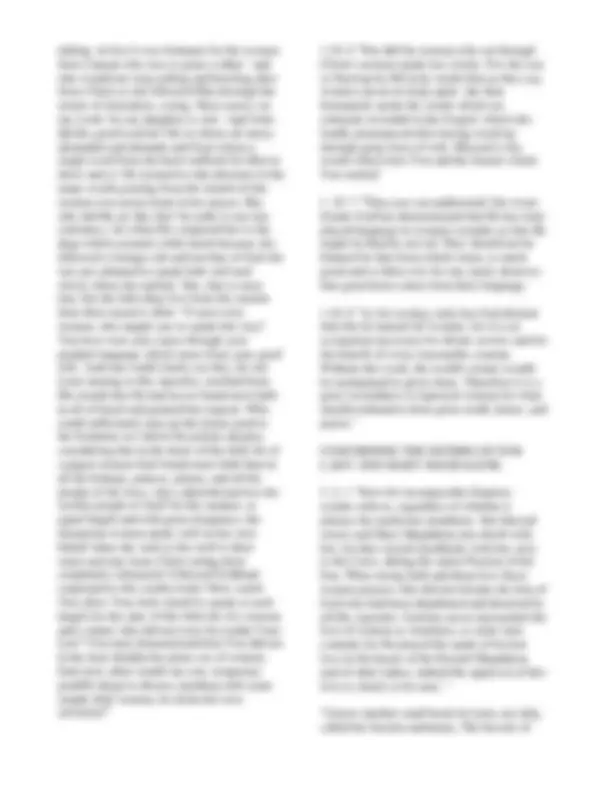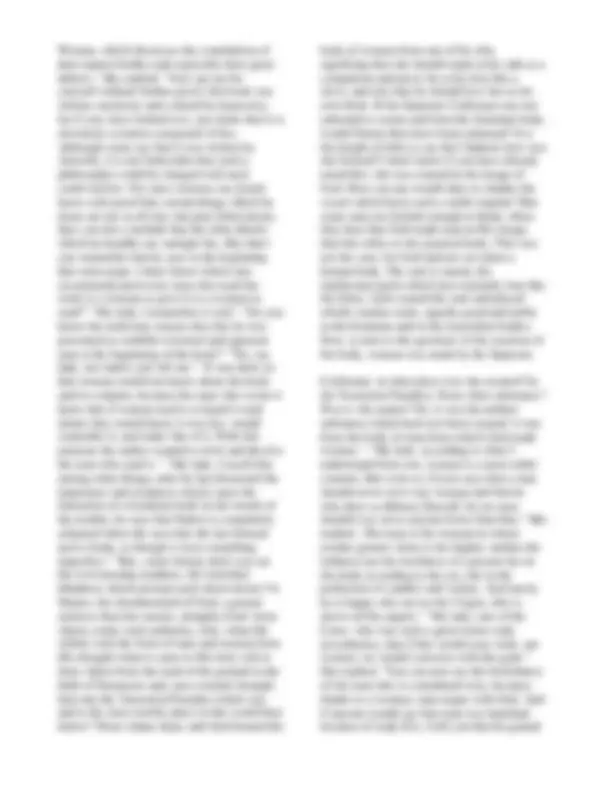





Study with the several resources on Docsity

Earn points by helping other students or get them with a premium plan


Prepare for your exams
Study with the several resources on Docsity

Earn points to download
Earn points by helping other students or get them with a premium plan
Community
Ask the community for help and clear up your study doubts
Discover the best universities in your country according to Docsity users
Free resources
Download our free guides on studying techniques, anxiety management strategies, and thesis advice from Docsity tutors
In this document, Christine de Pizan advocates for women's education and capabilities, citing historical examples of influential and educated women. She challenges the common belief that women are inferior to men and argues that their tears and speech are divine gifts. The text also touches upon the importance of women's role in spreading news and their contributions to divine service.
What you will learn
Typology: Slides
1 / 6

This page cannot be seen from the preview
Don't miss anything!




Most modern feminist scholars date the beginning of the modern feminist movement to the works of Christine de Pizan which sparked the discussion of the querelle des femmes , the woman question. Continuing the themes developed in her Debate on the Romance of the Rose , a few years later in City of Ladies , de Pizan presents a dream-vision of a utopian city for women inhabited by powerful, educated, and influential women both of antiquity and of her own time.
Her father was Tommaso di Benvenuto da Pizzano (Pizzano was a small village in the foothills to the southeast of the Emilian capital)^4 , a lecturer in astrology at the University of Bologna (1348) and later physician. Bologna and Paris were leading education centers of the time. 5 Tomasso left Bologna for Venice in 1357^6 where Christine was born in 1365. Shortly after Christine's birth, he became court astrologer to Charles V, moving his family to Paris to be with him in
Exactly how Christine was educated and managed to become a professional writer is unclear. We know that her husband was a royal secretary, a position occupied by the intellectual elite of the time and often the first step in an illustrious political career. Christine remarked that her father had been well regarded at court and some historians speculate that he was an adviser to the court librarian on scientific books. Charles V's library was if not the best, then one of the best, in Europe. Such a position would explain her father's reputation, Christine's access to books, Christine's knowledge of both the printing trade and the best craftsmen in the trade, and Christine's entree into the circles of the rich and powerful^8. Unfortunately Charles V died in 1380 when his son and successor, the future Charles VI, was only 12 years of age. Although Charles V had created a regency
staffed by his best servants, his powerful brothers did not honor his wishes and many of his servants, including Christine's father, fell on hard times.^9
Educated by her father in spite of her mother's objections, Christine was happily married at age 15 to Étienne du Castel, royal secretary, who encouraged her to continue her studies.^10 Widowed at age 25 and left with three children, a niece, and her own widowed mother to support,^11 only now did de Pizan seriously embark on a program of self education. Her father had died impoverished and her husband's estate took 14 years and numerous lawsuits to close.^12
De Pizan was France's, and possibly Europe's, first woman known to have earned her living by the pen. Since she was commissioned to writes some of her works, some scholars consider her Europe's first professional writer. While establishing her reputation as a writer, she earned her living by copying and illustrating other people's works.^13 Her works included all genres: biography, autobiography, poetry, history, novels, short stories, feminist polemics, books on advice and morality, military techniques, religion, politics, and literary commentary. A list of only her major publications shows how prolific she was as a writer, the range of subjects which she addressed, and only some of the writing styles that she used.
2.36.1 Following these remarks, 1, Christine, spoke, "My lady, I realize that women have accomplished many good things and that even if evil women have done evil, it seems to me, nevertheless, that the benefits accrued and still accruing because of good women-particularly the wise and literary ones and those educated in the natural sciences whom I mentioned above-outweigh the evil. Therefore, I am
amazed by the opinion of some men who claim that they do not want their daughters, wives, or kinswomen to be educated because their mores would be ruined as a result." She responded , Here you can clearly see that not all opinions of men are based on reason and that these men are wrong. For it must not be presumed that mores necessarily grow worse from knowing the moral sciences, which teach the virtues, indeed, there is not the slightest doubt that moral education amends and ennobles them. How could anyone think or believe that whoever follows good teaching or doctrine is the worse for it? Such an opinion cannot be expressed or maintained. I do not mean that it would be good for a man or a woman to study the art of divination or those fields of learning which are forbidden-for the holy Church did not remove them from common use without good reason-but it should not be believed that women are the worse for knowing what is good. "Quintus Hortensius, a great rhetorician and consummately skilled orator in Rome, did not share this opinion. He had a daughter, named Hortensia, whom he greatly loved for the subtlety of her wit. He had her learn letters and study the science of rhetoric, which she mastered so thoroughly that she resembled her father Hortensius not only in wit and lively memory but also in her excellent delivery and order of speech-in fact, he surpassed her in nothing. As for the subject discussed above, concerning the good which comes about through women, the benefits realized by this woman and her teaming were, among others, exceptionally remarkable. That is, during the time when Rome was governed by three men, this Hortensia began to support the cause of women and to undertake what no man dared to under- take. There was a question whether certain taxes should be levied on women and on their jewelry during a needy period in Rome. This woman's eloquence was so compelling that she was listened to, no less readily than her father would have been, and she won her case.
2.36.3 "Similarly, to speak of more recent times, without searching for examples in ancient history, Giovanni Andrea, a solenm
law professor in Bologna not quite sixty years ago, was not of the opinion that it was bad for women to be educated. He had a fair and good daughter, named Novella, who was educated in the law to such an advanced degree that when he was occupied by some task and not at leisure to present his lectures to his students, he would send Novella, his daughter, in his place to lecture to the students from his chair. And to prevent her beauty from distracting the concentration of her audience, she had a little curtain drawn in front of her. In this manner she could on occasion supplement and lighten her father's occupation. He loved her so much that, to commemorate her name, he wrote a book of remarkable lectures on the law which he entitled Novella super Decretalium, after his daughter's name.
2.36.4 "Thus, not all men (and especially the wisest) share the opinion that it is bad for women to be educated. But it is very true that many foolish men have claimed this because it displeased them that women knew more than they did. Your father, who was a great scientist and philosopher, did not believe that women were worth less by knowing science; rather, as you know, he took great pleasure from seeing your inclination to learning. The feminine opinion of your mother, however, who wished to keep you busy with spinning and silly girlishness, following the common custom of women, was the major obstacle to your being more involved in the sciences. But just as the proverb already mentioned above says, No one can take away what Nature has given,'your mother could not hinder in you the feeling for the sciences which you, through natural inclination, had nevertheless gathered together in little droplets. I am sure that, on account of these things, you do not think you are worth less but rather that you consider it a great treasure for yourself; and you doubtless have reason to. " And 1, Christine, replied to all of this, "Indeed, my lady, what you say is as true as the Lord's Prayer."
talking -in fact it was fortunate for the woman from Canaan who was so great a talker ' and who would not stop yelling and howling after Jesus Christ as she followed Him through the streets of Jerusalem, crying, 'Have mercy on me, Lord, for my daughter is sick.' And what did the good Lord do? He in whom all mercy abounded and abounds and from whom a single word from the heart sufficed for Him to show mercy! He seemed to take pleasure in the many words pouring from the mouth of this woman ever perseverant in her prayer. But why did He act like this? In order to test her constancy, for when He compared her to the dogs-which seemed a little harsh because she followed a foreign cult and not that of God-she was not ashamed to speak both well and wisely when she replied, 'Sire, that is most true, but the little dogs live from the crumbs from their master's table.' 'O most wise woman, who taught you to speak this way? You have won your cause through your prudent language which stems from your good will.' And one could clearly see this, for our Lord, turning to His Apostles, testified from His mouth that He had never found such faith in all of Israel and granted her request. Who could sufficiently sum up this honor paid to the feminine sex which the jealous despise, considering that in the heart of this little bit of a pagan woman God found more faith than in all the bishops, princes, priests, and all the people of the Jews, who called themselves the worthy people of God? In this manner, at equal length and with great eloquence, the Samaritan woman spoke well on her own behalf when she went to the well to draw water and met Jesus Christ sitting there completely exhausted. 0 blessed Godhead conjoined to this worthy body! How could You allow Your holy mouth to speak at such length for the sake of this little bit of a woman and a sinner who did not even live under Your Law? You truly demonstrated that You did not in the least disdain the pious sex of women. God, how often would our con- temporary pontiffs deign to discuss anything with some simple little woman, let alone her own salvation?"
1.10. 6 "Nor did the woman who sat through Christ's sermon speak less wisely. For she was so fired up by His holy words that-as they say, women can never keep quiet- she then fortunately spoke the words which are solemnly recorded in the Gospel, which she loudly pronounced after having stood up through great force of will, 'Blessed is the womb which bore You and the breasts which You sucked.'
1.10. 8 "As for sewing, truly has God desired that this be natural for women, for it is an occupation necessary for divine service and for the benefit of every reasonable creature. Without this work, the world's estates would be maintained in great chaos. Therefore it is a great wickedness to reproach women for what should redound to their great credit, honor, and praise."
CONCERNING THE SISTERS OF OUR LADY AND MARY MAGDALENE.
"I know another small book in Latin, my lady, called the Secreta mulierum, The Secrets of
Women, which discusses the constitution of their natural bodies and especially their great defects." She replied, "You can see for yourself without further proof, this book was written carelessly and colored by hypocrisy, for if you, have looked at it, you know that it is obviously a treatise composed of lies. Although some say that it was written by Aristotle, it is not believable that such a philosopher could be charged with such contrived lies. For since women can clearly know with proof that certain things which he treats are not at all true, but pure fabrications, they can also conclude that the other details which he handles are outright lies. But don't you remember that he says in the beginning that some pope- I don't know which one- excommunicated every man who read the work to a woman or gave it to a woman to read?" "My lady, I remember it well." "Do you know the malicious reason why this lie was presented as credible to bestial and ignorant men at the beginning of the book?" "No, my lady, not unless you tell me." "It was done so that women would not know about the book and its contents, because the man who wrote it knew that if women read it or heard it read aloud, they would know it was lies, would contradict it, and make fun of it. With this pretense the author wanted to trick and deceive the men who read it. " "My lady, I recall that among other things, after he has discussed the impotence and weakness which cause the formation of a feminine body in the womb of the mother, he says that Nature is completely ashamed when she sees that she has formed such a body, as though it were something imperfect." "But, sweet friend, don't you see the overweening madness, the irrational blindness which prompt such observations? Is Nature, the chambermaid of God, a greater mistress than her master, almighty God- from whom comes such authority, who, when He willed, took the form of man and women from His thought when it came to His holy will to form Adam from the mud of the ground in the field of Damascus and, once created, brought him into the Terrestrial Paradise which was and is the most worthy place in this world here below? There Adam slept, and God formed the
body of woman from one of his ribs, signifying that she should stand at his side as a companion and never lie at his feet like a slave, and also that he should love her as his own flesh. If the Supreme Craftsman was not ashamed to create and form the feminine body, would Nature then have been ashamed? It is the height of folly to say this! Indeed, how was she formed? I don't know if you have already noted this: she was created in the image of God. How can any mouth dare to slander the vessel which bears such a noble imprint? But some men are foolish enough to think, when they hear that God made man in His image, that this refers to the material body. This was not the case, for God had not yet taken a human body. The soul is meant, the intellectual spirit which lasts eternally Just like the Deity. God created the soul and placed wholly similar souls, equally good and noble in the feminine and in the masculine bodies. Now, to turn to the question' of the creation of the body, woman was made by the Supreme
Craftsman. in what place was she created? In the Terrestrial Paradise. From what substance? Was it vile matter? No, it was the noblest substance which had ever been created: it was from the body of man from which God made woman. " "My lady, according to what I understand from you, woman is a most noble creature. But even so, Cicero says that a man should never serve any woman and that he who does so debases himself, for no man should ever serve anyone lower than him." She replied , The man or the woman in whom resides greater virtue is the higher; neither the loftiness nor the lowliness of a person lies in the body according to the sex, but in the perfection of conduct and virtues. And surely he is happy who serves the Virgin, who is above all the angels." "My lady, one of the Catos- who was such a great orator-said, nevertheless, that if this world were with- out women, we would converse with the gods." She replied, "You can now see the foolishness of the man who is considered wise, because, thanks to a woman, man reigns with God. And if anyone would say that man was banished because of Lady Eve, I tell you that he gained